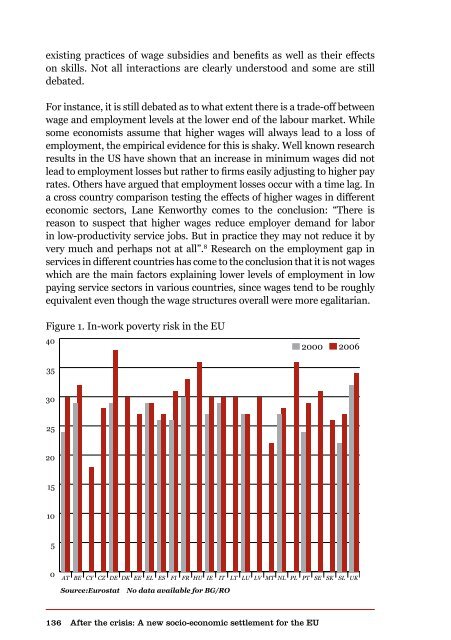Authors Iain Begg | Gabriel Glöckler | Anke Hassel ... - The Europaeum
Authors Iain Begg | Gabriel Glöckler | Anke Hassel ... - The Europaeum
Authors Iain Begg | Gabriel Glöckler | Anke Hassel ... - The Europaeum
You also want an ePaper? Increase the reach of your titles
YUMPU automatically turns print PDFs into web optimized ePapers that Google loves.
existing practices of wage subsidies and benefits as well as their effects<br />
on skills. Not all interactions are clearly understood and some are still<br />
debated.<br />
For instance, it is still debated as to what extent there is a trade-off between<br />
wage and employment levels at the lower end of the labour market. While<br />
some economists assume that higher wages will always lead to a loss of<br />
employment, the empirical evidence for this is shaky. Well known research<br />
results in the US have shown that an increase in minimum wages did not<br />
lead to employment losses but rather to firms easily adjusting to higher pay<br />
rates. Others have argued that employment losses occur with a time lag. In<br />
a cross country comparison testing the effects of higher wages in different<br />
economic sectors, Lane Kenworthy comes to the conclusion: “<strong>The</strong>re is<br />
reason to suspect that higher wages reduce employer demand for labor<br />
in low-productivity service jobs. But in practice they may not reduce it by<br />
very much and perhaps not at all”. 8 Research on the employment gap in<br />
services in different countries has come to the conclusion that it is not wages<br />
which are the main factors explaining lower levels of employment in low<br />
paying service sectors in various countries, since wages tend to be roughly<br />
equivalent even though the wage structures overall were more egalitarian.<br />
Figure 1. In-work poverty risk in the EU<br />
136<br />
After the crisis: A new socio-economic settlement for the EU

















